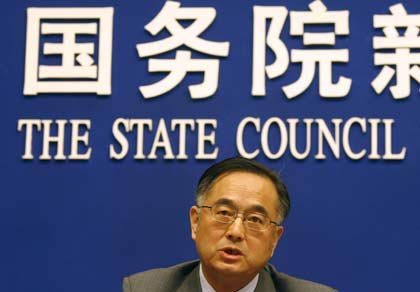Bird flu samples on way to US
By Zhao Huanxin (China Daily)Updated: 2006-11-11 10:01
The latest shipment of bird flu virus samples from China
is expected to reach the United States next week, senior health officials said
in Beijing on Friday.
 Jia Youling, China's chief veterinary officer, holds a news conference at the State Council Information Office in Beijing November 10, 2006. [Reuters]  |
"Following the five bird flu strains delivered in 2004, the Ministry of Agriculture has provided 20 more virus samples to the World Health Organization," China's Chief Veterinary Officer Jia Youling told a press conference organized by the State Council Information Office.
"We are happy about the development," Henk Bekedam, the WHO's China representative, told China Daily.
"I don't know what kind of clearance they'll have to go through on the other side, how long it will take, but we expect the CDC can confirm they have received them some time next week."
China told the WHO Beijing office on March 1 that it was ready to provide the 20 samples requested by the UN organization in early February, according to Jia.
But it took time to arrange the logistics and go through customs procedures for both the Chinese side, the WHO and the recipient of the shipment of highly pathogenic virus samples, Jia said.
China has been co-operative in sharing bird flu information and samples, despite four of five samples submitted in 2004 being misused by some foreign researchers, he added.
The WHO made the samples available to foreign researchers, who twice published the genetic sequence and other data of four of the five samples without giving credit to the Chinese scientists who did the research.
Bekedam said he had apologized on behalf of the WHO collaborating centre and he hoped there would not be a repeat of the situation.
He stressed that sharing information and sharing samples is key in the fight against communicable and new diseases.
At Friday's press conference, Jia and his colleagues categorically rejected claims by US and Hong Kong researchers that a new, vaccine-resistant H5N1 virus variant, called Fujian-like, was isolated in southern China, which caused five recent human infections in the region.
The researchers claimed in a paper published last week in the Proceedings of the National Academy of Sciences of the United States that the virus had already triggered an outbreak in neighbouring countries.
Commenting on the study, Jia said: "There is no such new 'Fujian-like variant' at all. It is utterly groundless to assert that the outbreak of bird flu in Southeast Asia was caused by avian influenza in China."
He said the data cited in the paper were "unauthentic" and the research methodology was not based on science.
The WHO's Bekedam said: "We hope that in the future these scientists will be sitting down together and they will have fewer discussions in the media but more discussions among scientists, and then that we can all share what their finding is."
At a press conference on the so-called Fujian-like variant on Thursday in Geneva, Minister of Health Gao Qiang said he had issued a formal invitation to the WHO, asking the organization to send experts to China to judge the real situation.
"These experts can go to any place in China, and we hope they can evaluate China's avian flu control situation in a scientific and technical way," he was quoted as saying by the Xinhua News Agency.
Gao said the Chinese Government is open, transparent, objective and responsible in the prevention and control of bird flu.
|
||
|
||
|
|

